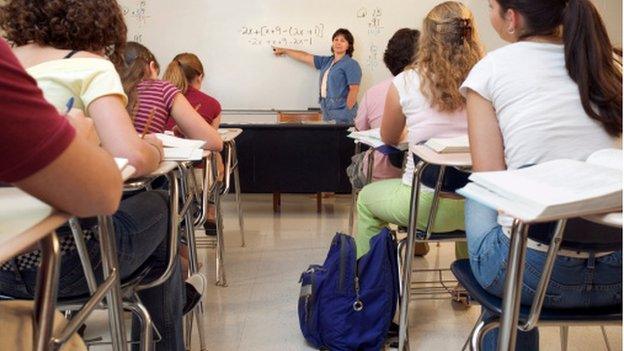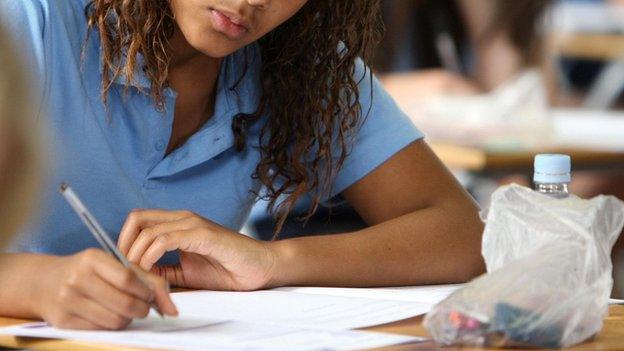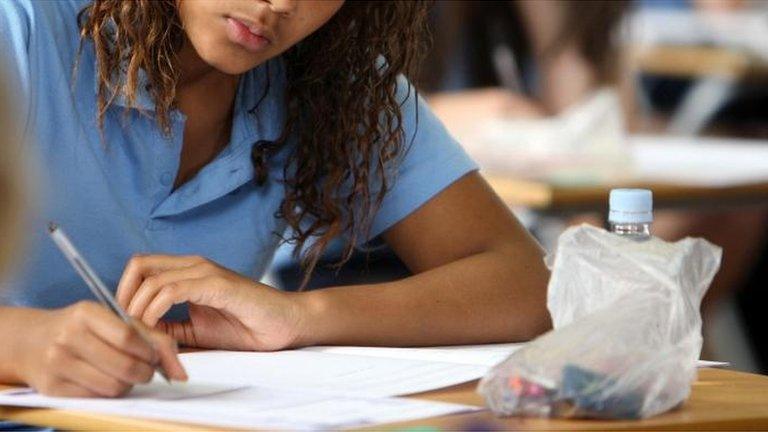Post-16 education 'must improve' says charity
- Published

The charity asks how easy it is for students who do not get good grades at 16 to catch up by 19
Post-16 education must improve to help all teenagers without good GCSEs to catch up, says a charity.
Too many of those who retake English and maths fail to achieve the benchmark A* to C grades by 19, says Impetus PEF, external.
Since 2013, teenagers in England who do not meet the standard at 16 have had to study the subjects until they are 19.
The Association of Colleges said its members had "embraced the challenge" of ensuring all students achieve a good level of core skills.
The charity, which funds groups working with young people who are not in education, employment or training, says the most recent results for post-16 education suggest many students do not improve their standards despite the extra years of study.
And this is particularly true of students from poorer homes, who are statistically more likely to need to resit their GCSEs to achieve the benchmark standard, say the researchers.
The results for the first students to continue to study English and maths after 16 will not be available until next year - so the researchers analysed existing results.
They looked at the most recent Department for Education figures, external - for students who left school at 16 without good grades in English and maths in 2012 - before the rules changed.
Overall, in 2012, 201,683 students left school without achieving A* to C in English and 186,160 in maths.
In English, just over a quarter of these enrolled on a post-16 catch-up course, while the figure for maths was 20%.
But well over half (58%) of those who retook English still did not achieve the required grade the age of 19.
In maths the figure was 65%.
The researchers point out that students eligible for free school meals fared appreciably worse than better-off students, according to a separate set of government figures, external for young people turning 19 in 2014.

Students eligible for free school meals found it particularly hard to catch up, the researchers found
Of those on free school meals, only 39% had achieved good grades in English and maths GCSE or equivalent at 16, compared with 65% of their better-off peers.
By 19, just 45% of those on free school meals had achieved the benchmark standard, compared with 71% of the better-off students.
The researchers say these figures suggest the post-16 system will struggle to boost outcomes for the larger group of people now staying on in education or training.
"Current performance of post-16 provision suggests the system will struggle to get all young people who failed at 16 caught up by 19 as they aren't doing this well for the small number who enrol currently," they argue.
"Given there are more free school meals students not achieving at 16, the significant proportion of the students who will be required to catch up will be from a disadvantaged background, which suggests a higher proportion of free school meals students will not catch up by 19, if post-16 provision continues to perform as it is now."
'Fewer options'
Impetus PEF chief executive Andy Ratcliffe said catching up was crucial for young people.
"If they don't get the grades at 16, they need a second chance to catch up by 19. Sadly, most don't catch up and without those qualifications life after school is much tougher, with fewer options for jobs and education."
Catherine Sezen of the Association of Colleges, said the new rules gave colleges the challenge of giving a growing number of 16-year-olds a second chance at English and maths GCSEs "after 11 years at school", alongside training them for technical and professional qualifications.
"Colleges, schools and the government must work together to ensure that all students achieve a good level of core skills in these subjects by the time they leave education and training," said Ms Sezen.
A Department for Education spokesman said the government was providing an extra £480 per student, per subject for all those with GCSE English or maths below grade C.
It had also invested £30m over the past two years to boost core skills in the further education workforce, said the spokesman.
To help colleges boost grades
- Published11 September 2014

- Published2 September 2013
